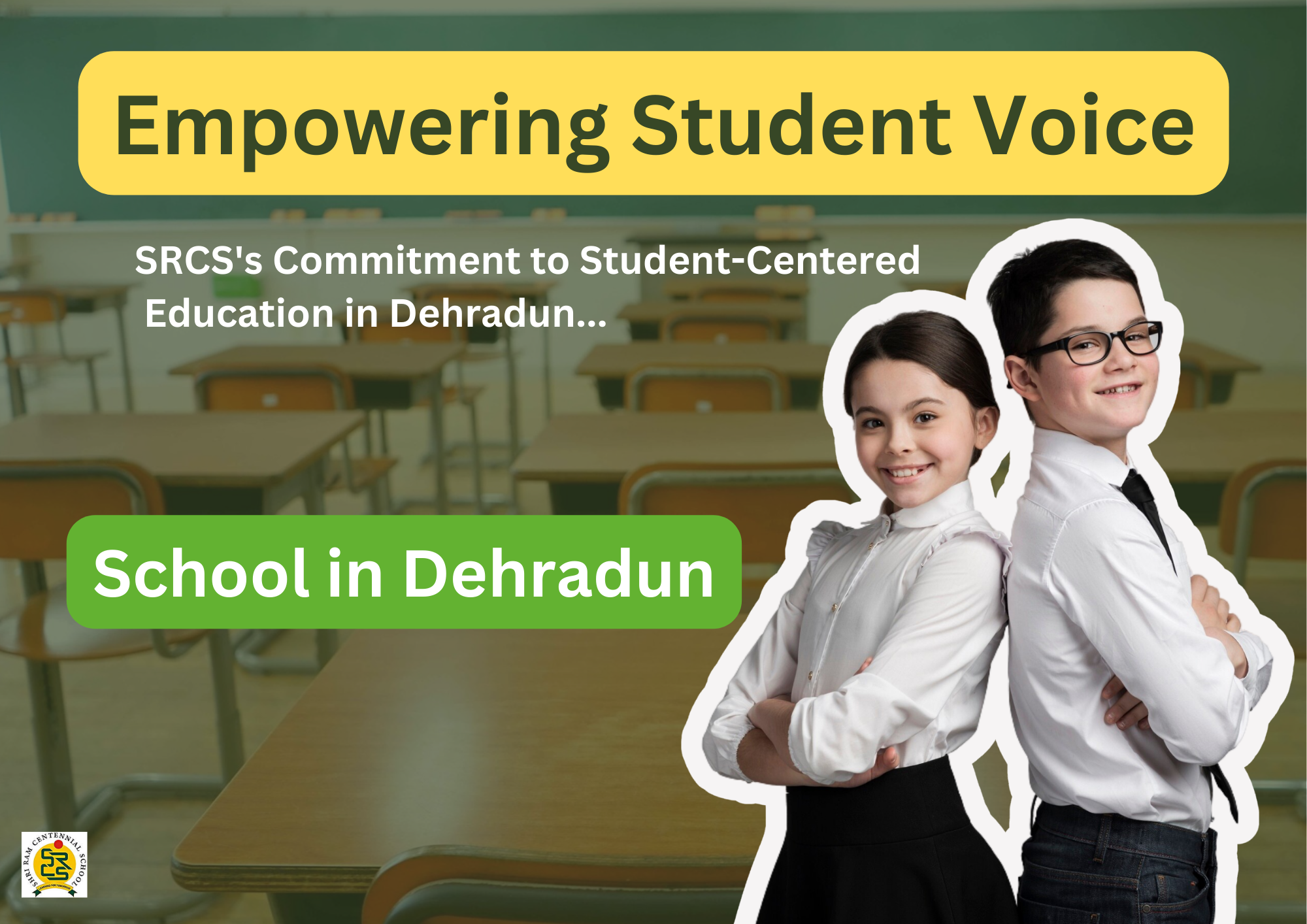The educational landscape is undergoing a significant shift. Gone are the days of rote learning and teacher-centered classrooms. Today, progressive schools like Shri Ram Centennial School (SRCS) in Dehradun are embracing a student-centered approach, where students are active participants in their learning journey. At the heart of this philosophy lies the concept of empowering student voice.
This article delves into SRCS’s unwavering commitment to student-centered education in Dehradun. We’ll explore the various ways the school fosters student voice, the benefits it brings to the learning experience, and how it prepares students for success beyond academics.
Understanding Student Voice

Student voice refers to the opportunity for students to express their ideas, opinions, and concerns about their educational experience. It encompasses a wide range of activities, from providing feedback on classroom practices to participating in decision-making processes. When students feel empowered to share their voices, it fosters a sense of ownership over their learning and creates a more dynamic and engaging classroom environment.
SRCS’s Initiatives to Empower Student Voice

SRCS implements a multitude of initiatives to cultivate a culture where student voice thrives. Here are some key examples:
- Student Council: A vibrant student council acts as a bridge between students and the school administration. Council members are elected by their peers and play a crucial role in representing student concerns and ideas. They collaborate with teachers and administrators on issues ranging from extracurricular activities to school facilities.
- Class Discussions and Debates: SRCS classrooms are designed to be forums for open discussion and debate. Teachers encourage students to actively participate by asking questions, expressing their opinions, and respectfully defending their viewpoints. This not only fosters critical thinking skills but also allows students to feel comfortable expressing themselves.
- Student-Led Projects: Students are encouraged to take ownership of their learning by initiating and leading projects that align with their interests and learning goals. This could involve research projects on topics of their choice, organizing school events, or even developing presentations for younger students.
- Student Feedback Mechanisms: SRCS employs various methods to gather student feedback, such as anonymous surveys, suggestion boxes, and one-on-one meetings with teachers and counselors. This feedback is taken seriously and used to improve teaching practices, curriculum development, and the overall school environment.
Benefits of Empowering Student Voice

The benefits of empowering student voice are far-reaching and extend beyond simply improving classroom engagement. Here’s how it impacts students:
- Increased Motivation and Ownership: When students feel their voices are heard and valued, they become more invested in their learning. They take ownership of their education and are more motivated to excel.
- Development of Critical Thinking Skills: Active participation in discussions and debates hones critical thinking skills. Students learn to analyze information, form arguments, and support their viewpoints with evidence.
- Enhanced Communication Skills: Expressing ideas clearly and confidently is a vital life skill. By giving students opportunities to present their ideas in front of their peers and teachers, SRCS fosters strong communication skills.
- Building Self-Confidence: The ability to express oneself freely and confidently boosts self-esteem. When students feel comfortable sharing their voices, they develop a sense of self-worth and become more assertive individuals.
- Preparation for the Future: The ability to think critically, communicate effectively, and advocate for oneself are essential skills for success in college, careers, and life in general. By empowering student voices, SRCS prepares students for the future beyond academics.
Examples of Student Voice in Action at SRCS

To illustrate the impact of student voice at SRCS, let’s consider some real-life examples:
- Revamping the School Canteen Menu: Based on student feedback through surveys and suggestion boxes, the school canteen menu was revamped to include healthier and more diverse options.
- Introducing a New Club: Students passionate about environmental issues expressed their desire for an environmental club. The school administration, recognizing the student interest, facilitated the formation of the club, allowing students to organize green initiatives and awareness campaigns.
- Modifying Classroom Layouts: Through student council discussions, a concern was raised about the traditional classroom layout hindering collaboration. The school, in response to student voice, implemented flexible furniture arrangements to promote teamwork and interaction.
These examples showcase how SRCS actively listens to its students and takes concrete steps to address their concerns and ideas. This not only fosters a sense of agency but also demonstrates the school’s commitment to a truly student-centered approach.
Addressing Challenges and Ensuring Sustainability
Empowering student voice is not without its challenges. Teachers may require training to facilitate open discussions and manage diverse student opinions. Additionally, ensuring that all students feel comfortable expressing themselves can be a continuous process.
SRCS tackles these challenges head-on by providing professional development opportunities for teachers on fostering
Conclusion
SRCS’s commitment to empowering student voice is a testament to its progressive approach to school in Dehradun. By creating a space where students feel empowered to share their ideas, concerns, and aspirations, SRCS fosters a vibrant learning environment that prepares students for academic success and life beyond the classroom. The benefits of student voice are undeniable – increased motivation, enhanced communication skills, and the development of critical thinking abilities are all essential for success in today’s world.
As SRCS continues to refine its practices and address challenges, it paves the way for a future generation of empowered and articulate young individuals. By prioritizing student voice, SRCS ensures that education is not just about absorbing information, but about fostering a love for learning, building self-confidence, and empowering students to become active participants in shaping their own educational journeys.











